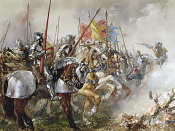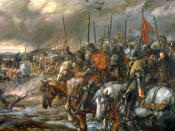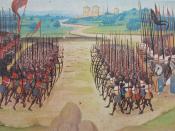In Aristotle?s book on rhetoric, Aristotle defines rhetoric loosely as the ability to observe in any situation the possibility of persuasion. Instead of their being a ?right? or ?wrong? answer to any situation, rhetoric is more intent with the fact that their are sides to every issue. With the existence of different sides in an issue, rhetoric uses several methods to help provide tangible methods of persuasion. These methods are broken down in three different realms: Logos, Pathos and Ethos. Although each method can be beneficial to the discussion, important parts would be left out if only one was used to prove a point. In a ?perfect? world a logic argument would be all that is needed to prove a point; however, being human and having an emotional side creates the need for all three to be used correctly and effectively during an argument or discussion. Each method is unique and does contain qualities that are needed to communicate the whole argument.
Ethos attempts to speak to the believability of the deliver of the message. As a message is delivered, certain qualities or traits can be and are communicated to the audience. These might include their perceived attitude, friendliness, and overall trustworthiness. Pathos part of a message is directed towards the audience and tries to stir their own unique individual characteristics that ?define? who they are. Personality trains and background and emotions all fit under this header. Pathos attempts to persuade based on what is beneficial to us; to stir up our feelings where we feel an advantage on one side of the argument. Logos speaks to the logicality of the argument. Some might see this as the true argument in the strictest terms of the word. This part of the argument is where facts and statistics would come into play. Equivalent arguments and demonstration could be used here to logically ?prove? the truthfulness of the argument.
In Pericle?s Funereal Oration, all three methods are seen as evidence by the follow examples: In the second paragraph, Pericles conveys his own personal convictions by mentioning that it was his ?duty to obey the law.? This statement, part of Ethos, helps to establish the audience?s perception of his character as a duty bound law-abiding citizen. Pathos is used in the very next sentence with by speaking about their common ancestors. He mention their military success and success as a society. This helps establish the audience?s identity and self-interest values. He also mentions in paragraph 8 of the handout, that the reason he has spent so much time talking about the character of their country is that is their country is worthy of such praises for the cultural refinement and abilities. The Logos part of the argument takes place in the last few paragraphs. Pericle?s tries to get Athenians to think about their future children, to see all the factors that the future might hold: ?you who are still of an age to beget children must bear up in the hope of having other in there stead;? Logically, the funeral must end and life must go on. After this you can see that this message is being conveyed using all three parts of rhetoric: logos, pathos and ethos.
In Henry V Ethos, Logos and Pathos are also employed in much the same way, however it seems more difficult to extract. The use of Pathos during this speech is evidence by the use of terms such as ?cousin? and ?our country? provides a sense of shared common identity to the audience; a common history and ancestral base. Ethos in this speech is visibly similar to the funeral oration. The King uses the word ?Honour? several time to establish his character and his belief system and hopefully it will be the same as the audience and allow for a additional common tread between them all.
I personally find Logos lacking a bit more from this speech than the oration. The King does not seem to use Logos during this story other than the continued existence of England with the words ?we in it shall be remembered? maybe in an attempt to logically persuade them to think about the future? Both the Crispin day speech and President Bush?s speech both seem to be a ?Rally The Troops? message designed to invigorant the masses. The Crispin speech was written as a fictional account of the Battle of Agincourt while the Bush speech was the speech given by President Bush to announce a ?battle of ideals? against Iraq. Bush uses the same methods by joining the nation under the terrorist attack. He uses the words ?duty? and ?dignity? to link his character values to that of the audience to build a common thread. Bush also uses Logos better by showing the logically reason why a defiant Iraq is a threat. I think, because of length and ?in-depth-ness? of Bush article I would be emboldened by his speech.
Sources http://www.otal.umd.edu/~mikej/rhetoric/, October 8, 2002





